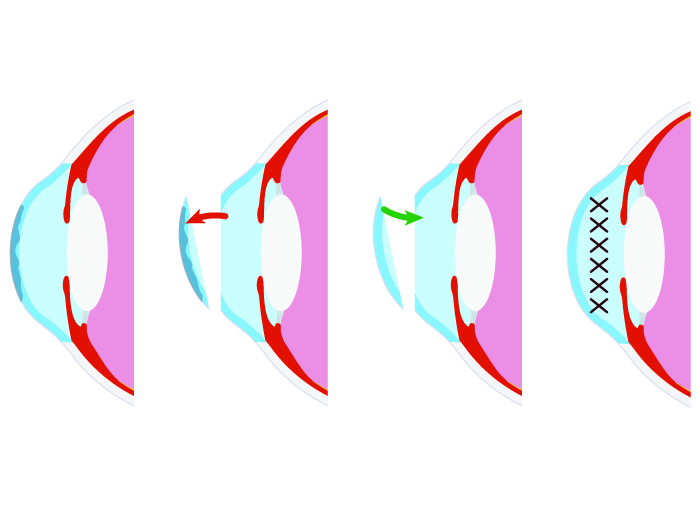Keratoplasty or Cornea Transplant Treatment & Diagnostics in Chirag Enclave, Delhi
Keratoplasty or Cornea Transplant
The cornea is the transparent, dome-shaped part of the human eye, through which light can enter the eye and reach its natural lens. Thus, any damage to the cornea can block vision. The damaged tissues of the cornea can be replaced by fresh cornea tissue from a donor. This surgical method is medically termed keratoplasty or cornea transplant. It is essential to restore vision and plenty of people have successfully undergone keratoplasty treatment in Delhi.
What is keratoplasty?
First of all, keratoplasty doctors in Delhi need to find a donor who has passed away recently but did not have any kind of contagious eye disease. The doctors administer a sedative or local anesthesia to keep the eye numb during the surgery. There are different types of keratoplasty and doctors decide which one to resort to as per the condition of the eye and the necessity of cornea replacement. The doctors give eye drops and oral medications to minimize post-surgical pain and swelling of the eyes.

Who qualifies for keratoplasty?
When the cornea of a person is partially or completely damaged due to a certain infectious disease or accident, keratoplasty is the best procedure to opt for. If your cornea becomes very thin due to any eye disease, keratoplasty doctors near you will recommend this surgery for the replacement of your cornea to restore your vision.
Request an appointment at Apollo Spectra Hospitals, Chirag Enclave, New Delhi.
Call 1860 500 2244 to book an appointment.
Why is keratoplasty conducted?
These can be some of the reasons:
- A severely damaged cornea demands treatment at a keratoplasty hospital in Delhi to relieve pain and loss of eyesight.
- When the cornea bulges out abnormally, this condition is called keratoconus and needs replacement surgery.
- A hereditary condition called Fuchs’ dystrophy causes fluid accumulation within the cornea, thickening it abnormally.
- The cornea becomes thinner and eventually tears off due to some infections.
- Your cornea can be scarred due to an injury.
- A severe corneal ulcer cannot be treated by oral medications and injections.
- If a previous eye surgery, like a cataract surgery, causes an infection or injury to the cornea, it needs replacement.
What are the different types of keratoplasty?
- Penetrating keratoplasty is performed when a doctor needs to cut through the entire cornea to take out the scarred or infected corneal tissue of a tiny button’s size. A keratoplasty specialist in Chirag Enclave uses a specific device to cut the corneal periphery neatly.
- Endothelial keratoplasty is used to remove the damaged corneal tissues, including the endothelium layer and the thin Descemet membrane covering the endothelium. Then the donor’s corneal tissue is used to replace the tissues removed. Two types of endothelial keratoplasty include Descemet stripping endothelial keratoplasty (DSEK) and Descemet membrane endothelial keratoplasty (DSMK).
- Anterior lamellar keratoplasty is used to remove the front part of corneal tissues, including the epithelium and stroma layers while keeping the back tissue layers untouched. Then the donor’s tissue is grafted to replace the removed tissues.
- Artificial corneal transplant or keratoprosthesis is applicable to patients who cannot qualify for receiving a cornea from a donor. They are provided with an artificial cornea.
What are the benefits of keratoplasty?
- It is a quick surgical procedure and the surgical wound gets healed very fast after the incision is stitched.
- You will recover very quickly and can return to normal life within a few days.
- You will be able to regain stable vision very shortly after this surgery.
What are the risks?
- There is a risk of infection from the tools used during the surgery.
- Your body may reject the donor’s cornea, leading to adverse effects.
- The stitches may not be able to secure the donor’s corneal tissues properly.
- The fluid pressure may increase within the eye, resulting in glaucoma.
- The retina may swell up and even get detached due to the surgery.
- Too much bleeding may occur during the surgery.
Since many people now pledge to donate their eyes during their lifetime, it is not too difficult to get a suitable donor for keratoplasty. Moreover, there is no need to match the tissues of the donor with those of the recipient.
You need to protect your eyes by wearing eye shields or protective glasses for a few days until your eyes are fully healed. You should not do vigorous exercises or any laborious work that can strain your eyes. You should not rub your eyes and avoid any injury to your eyes.
You need to undergo many diagnostic tests before keratoplasty. Then the doctor will take accurate measurements of your eyes to determine the size of the cornea. A keratoplasty specialist in Delhi will check all the medications you are currently taking and he/she will also prescribe medications to cure all other eye problems before the surgery.
Symptoms
Our Top Specialities
NOTICE BOARD
CONTACT US
CONTACT US
 Book Appointment
Book Appointment


.svg)
.svg)
.svg)
.svg)








